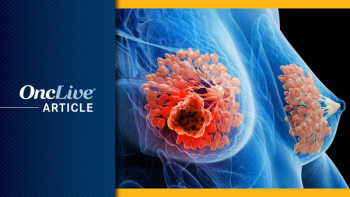
Treatment of ALK-Driven Refractory NSCLC
Transcript:
Mohammad Jahanzeb, MD: The question is if there’s any role for chemotherapy or immunotherapy in subsequent lines of therapy in patients with ALK-rearranged lung cancer when we have multiple options for targeted therapy. So, I think we’re still not curing anybody with metastatic disease who has an ALK rearrangement, even though it’s wonderful that we have high response rates with targeted therapy and multiple lines of targeted therapy work. Eventually, every patient who maintains a good enough performance status and has exhausted multiple lines of targeted therapy will become a candidate for chemotherapy.
The issue of immunotherapy is more problematic because, so far, whatever data we have accumulated showed that immunotherapy doesn’t work very well in patients with single-driver mutations. Immunotherapy works better in patients with high tumor burdens, patients who have lots of mutations, and usually patients who have had carcinogenic exposure or prolonged carcinogenic exposure, inducing multiple mutations in cells, causing cancer. Things such as, in the case of melanoma, exposure to UV radiation or, in the case of lung cancer, carcinogens in cigarette smoke. So, ALK-rearranged patients who were never-smokers or former light smokers and have a single-driver mutation are unlikely to respond to immunotherapy.
Corey J. Langer, MD: The use of immunotherapy in combination with ALK inhibitors is still highly experimental and certainly, from my standpoint, not ready for prime time. Early reports of phase I and phase II studies combining the new checkpoint inhibitors with ALK TKIs have been rather worrisome with heightened toxicities, and this extends not just to ALK inhibitors but also to EGFR inhibitors. A perfect example is the early work looking at osimertinib, a T790M-targeted agent, in combination with durvalumab, where we observed really untoward toxicity, heightened pulmonary toxicity, much more than we would have predicted with either agent alone. So, outside of a clinical trial, I would not attempt to either graft an immune checkpoint inhibitor onto a TKI or necessarily combine it with a second-generation TKI.
It’s my gestalt over time that the immune checkpoint inhibitors don’t work all that well with oncogenic drivers. Just to give you an example, we evaluated 175 patients receiving nivolumab from the time it was first approved in March of 2015 to 1 year later, March of 2016. And, uniformly, in individuals with either EGFR mutation or ALK translocation, we saw absolutely no responses in that group. So, the standard approach in individuals who are now ALK inhibitor—refractory—they’ve gone through 2 or 3 ALK inhibitors—remains chemotherapy. And, in that group, I would favor a pemetrexed combination if there’s no contraindication and renal function is adequate: generally, pemetrexed with carboplatin, with or without an angiogenesis inhibitor—usually bevacizumab.
I’d be much more favorably disposed toward looking at angiogenesis inhibitors in combination with TKIs. Again, one of our examples comes from the EGFR literature: a prospective randomized phase II trial from Japan that looked at erlotinib alone or erlotinib combined with bevacizumab, in which we observed about a 6.5- to 7-month improvement in progression-free survival that seemed to be independent of the nature of the EGFR mutation. I predict similar findings for the ALK inhibitors, although we’ve not actually seen the data as of yet.
Transcript Edited for Clarity




































